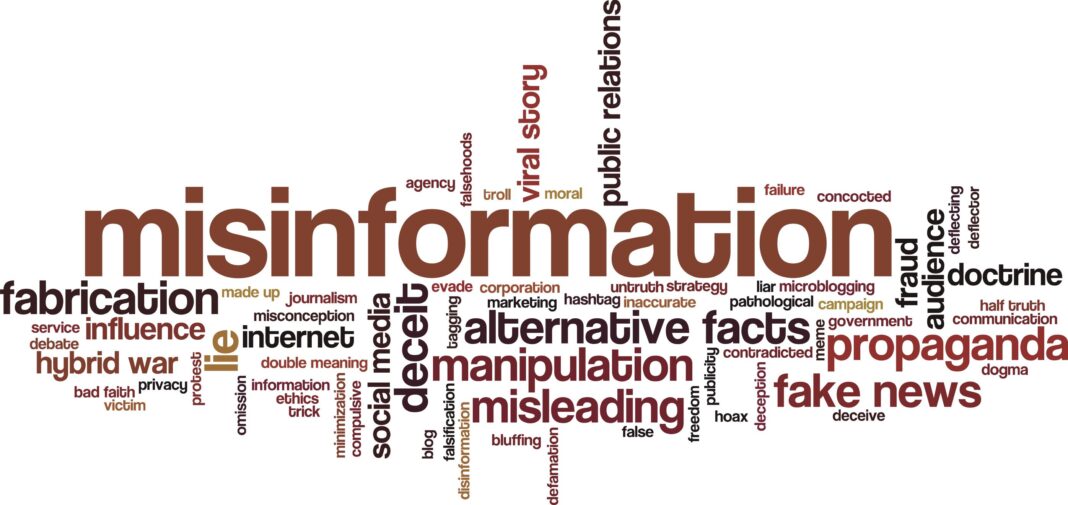Barack Obama recently took aim at misinformation on social media, calling it a threat to our society. Once the lies are widespread enough, he said, “[The people] lose trust in their leaders, mainstream media, in political institutions, in each other, the possibility of truth – the game’s won.”[1]
Obama was arguing toward the need for more regulation of social media. However, the problem of disinformation arises not just from social media. Falsehoods are all around us, being decried by Democrats and Republicans alike in the United States – often against each other.[2][3]The purpose is generally to win political points, even if the winning is done through the spreading of misinformation.[4]The mud flinging between these two parties is so thick, it would seem their definitions of misinformation have become any information with which they disagree. The abandoning of truth for gain may indeed be a threat to democracy, as Obama suggests, if widespread enough that accurately informed decisions become impossible or unlikely.
Experts in the theory of epistemology – the philosophical study of the nature of knowledge – would agree with Obama.[5]Misinformation is indeed damaging to society, and it is not always the biggest lie that does the most damage.
The smallest lie from a trusted source can be the most harmful.
Misinformation of the first kind: the bald-faced lie
There are many types of misinformation. It could be an outright lie, a conspiracy theory, doctored photographs and videos, the sowing of confusion, misleading news reports, or even overly partisan commentary in one-sided arguments.[6]Let us talk first about bald-faced lies, or misinformation of the first kind.
An obvious example is Lance Armstrong, after winning his seventh Tour de France while cheating pharmacologically, responding to his skeptics:
“How many times do I have to say it? … Well, it can’t be any clearer than ‘I’ve never taken drugs.’ ” [7]
And later, admitting to the lying in January of 2013, “All the fault and all the blame here falls on me. I viewed this situation as one big lie that I repeated a lot of times.”[8]
Even worse than the lie was, before his famous confession, Armstrong calling into question people seeking the truth:
“Finally, the last thing I’ll say to the people who don’t believe in cycling, the cynics and the sceptics: I’m sorry for you. I’m sorry that you can’t dream big. I’m sorry you don’t believe in miracles.”[9]
Lance’s outright deception was made worse by ridiculing those who were correct in questioning his performance. It is this remark that did the most damage to an ability to form new beliefs. Lies are the murder of faith.
A more recent bald-faced deception, and one that was given plenty of airtime on social media, was the claim that COVID vaccines contained microchips.[10]It was a ridiculous ruse, and images of an actual microchip (built for another purpose) were used to help fool people. Nonetheless, the preposterous story made the rounds.
Misinformation of the second kind: half-truths and white lies
In the early days of the COVID pandemic, top health authorities in the United States and Canada, Anthony Fauci and Theresa Tam suggested that healthy people should not or do not need to wear masks.[11][12]Both health officials eventually reversed this advice. Tam was asked at the time whether this was to protect the supplies of personal protective equipment (PPEs). Her answer was unclear. Fauci later admitted that his early policy remarks were indeed a lie of convenience to protect the supply of PPEs for healthcare workers.[13]
It was a small lie – a white lie, some would say – a lie of convenience, perpetrated for a perception of the common good. This is one example of misinformation of the second kind. It is not quite a bald-faced lie, but perpetrates a deception for a political purpose. And it is harmful, for later, healthcare authorities may need to legitimately change a policy when new information comes in. A rational individual now has reason to disbelieve them.[14]
Another element of the smaller type of misinformation is the kind that politicians often perpetrate in partisan arguments that ignore valid counterpoints and demonize opponents. For example, Alberta premier Jason Kenney recently called critics in his own United Conservative Party “extremists.”[15]This personal attack, or ad hominem fallacy, is common in political circles, and damages the public trust because here our leaders are using pejoratives rather than addressing issues.
Justin Trudeau’s recent invocation of the Emergency Act, covered in this article The Canadian prime minister’s emergency act, can be argued as perpetrating a lie. The declaration of emergency requires that there be “Threats to the security of Canada.” As the article lays out, the truckers’ protest – while inconvenient for some, and with an arguable lawfulness – would be unlikely to qualify as a threat to the security of Canada. By invoking the act, the Government of Canada relied on something of specious truth.
In many ways, Trudeau’s actions and Kenney’s words are similar, though in type, rather than scale. These are two political figures at opposite ends of the political spectrum, dealing with political opponents in ways more expedient than honest.
Damage to our institutions
Misinformation is studied by philosophers in the field of epistemology. Their interest is focused on the damage of misleading information on society’s ability to understand knowledge. The concern is that the more misinformation there is, the more damage there is to our ability to identify truth. A recent paper in the philosophical journal Inquiry dissects this question in detail.
“The epistemically bad effects of misinformation extend well beyond individuals who consume misinformation and end up with false or misleading beliefs. Misinformation also has subtle and pernicious indirect effects: acquiring knowledge and justified belief through testimony becomes more difficult and our beliefs lose various epistemically good-making modal properties.”[16]
The point being made is that an abundance of misinformation damages individuals’ ability to distinguish what is true, or even to form rational beliefs.
What does this have to do with the fundamental institutions of democracy? If misinformation damages our ability to recognize truth, it affects the perceived reliability of all sources of news, including those of governmental authorities. If we no longer trust our governmental authorities, our institutions are damaged. Our society is damaged.
So, what about the lesser of the two kinds of misinformation – the half-truths, white lies, the small distortions, the one-sided view of issues from authorities and politicians? It could be argued that these do the most damage to our institutions. If our ability to perceive truth is damaged elsewhere, but also by those in authority – even if it is in small ways – then we may feel we can trust no one. In that case, our functioning as a society is grievously injured.
The duty of those in authority
Lance Armstrong’s claim about competing cleanly qualifies as a bald-faced, outright lie, even if one on a subject of lesser objective value than, say, a pandemic. That he was one of the pre-eminent and influential athletes in the world at the time made his deceptions more damaging. Given Obama’s thesis – that the problem with misinformation is a loss in trust or the ability to perceive truth – the damage Armstrong did is easier to understand. The harm of his lie was proportionate to his authority.
People tell lies every day, often little white lies, but a belief in societal institutions requires faith in those institutions’ authorities. So, it is simple logic to conclude that Fauci’s early deception over masks – a lie of convenience – is far more damaging than the outright lies of a famous cyclist. Why? We expect our government leaders and healthcare authorities to tell the truth. We need them to be honest. Otherwise, who can we trust?
Summary
The outright lie is ultimately the less harmful of the two kinds of misinformation, for it is generally ridiculous, easier to spot, and readily dismissed. Few buy into the bald mistruth. It causes little of the lingering resentment of lost faith, for it was never really believed. It is the smaller of the two lies that destroys us and our institutions, for it is more difficult to identify, and, when discovered, makes us wonder if any argument is an honest one.
References
[1] Murphy, Mike, April 22, 2022, Obama says social media must be fixed: “People are dying because of misinformation”, Market Watch
[2] Hendel, John, February 24, 2021, Democrats attack fake news, and Republicans cry foul, Politico
[3] BBC Trending, April 15, 2017, The rise of left-wing, anti-Trump fake news, BBC News
[4] Osmundsen, Mathias, May 13, 2021, How partisan polarization drives the spread of fake news, Brookings
[5] Ridder, Jeroen de, November 16, 2021, What’s so bad about misinformation? Inquiry, An Interdisciplinary Journal of Philosophy
[6] Ridder, Jeroen de, November 16, 2021, What’s so bad about misinformation? Inquiry, An Interdisciplinary Journal of Philosophy
[7] McMillan, Stephan, Jan 18, 2013, Lance Armstrong’s doping denials-in quotes, The Guardian
[8] McMillan, Stephan, Jan 18, 2013, Lance Armstrong’s doping denials-in quotes, The Guardian
[9] Wyatt, Carolyne, July 24, 2005, Paris Salutes its American hero, BBC News
[10] Reuters Fact Check, May 28, 2021, Fact Check-Pictured microchip is unrelated to COVID-19 vaccine, Reuters
[11] Ross, Katherine, June 12, 2020, Why Weren’t We Wearing Masks from the Beginning? Dr. Fauci Explains, The Street
[12] Government of Canada, March 30, 2020, Government Update on COVID-19
[13] Ross, Katherine, June 12, 2020, Why Weren’t We Wearing Masks from the Beginning? Dr. Fauci Explains, The Street
[14] Mahal Inderveer, May 22, 2020, Why Theresa Tam changed her stance on masks, Macleans
[15] Bennett, Dean, March 24, 2022, UCP backbenchers break ranks, call on Jason Kenney to resign, Global News
[16] Ridder, Jeroen de, November 16, 2021, What’s so bad about misinformation? Inquiry, An Interdisciplinary Journal of Philosophy
(Lee Hunt – BIG Media Ltd., 2022)


